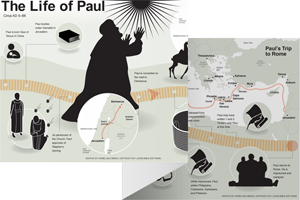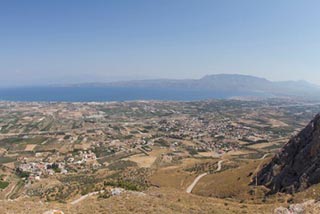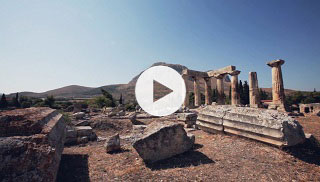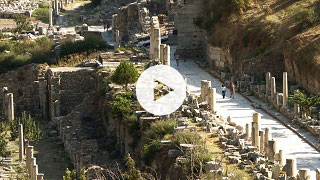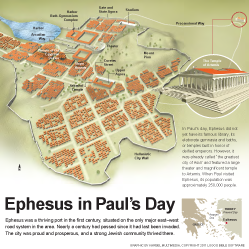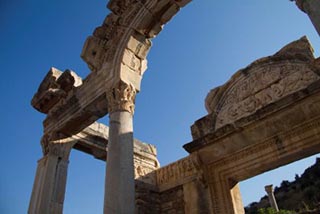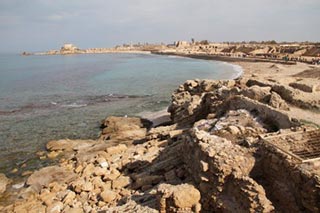18:1–11 Paul moves on from Athens and spends 18 months in Corinth (v. 11), another prominent city in the province of Achaia. |
18:1 Corinth Located about 40 miles west of Athens, Corinth was the capital of the Roman province Achaia and a major seaport.
18:2 Pontus A region of northern Asia Minor (modern-day Turkey) near the Black Sea.
Priscilla Also known as Prisca (see 1 Cor 16:19; Rom 16:3–5; 2 Tim 4:19).
Claudius had ordered Claudius’ expulsion of Jews from Rome occurred in ad 49, about two years before Paul arrived in Corinth.
 Political Leaders in the New Testament Table
Political Leaders in the New Testament Table
18:3 tentmakers This is the only reference to Paul’s trade as a tentmaker, though he writes in his letters about working with his hands in some places rather than accepting financial assistance (e.g., 1 Cor 4:12; 1 Thess 2:9; 2 Thess 3:7–8).
18:6 shook out his clothes This may allude to Neh 5:13 as well as Jesus’ words concerning those who reject God (Matt 10:14; Mark 6:11; Luke 10:11). Compare note on Luke 9:5.
Gentiles Paul does not mean that he is completely giving up on his mission to the Jews (compare Acts 18:19; 19:8; 28:17–22). Rather, he indicates that he will focus the rest of his time in Corinth elsewhere.
18:8 Crispus Mentioned in 1 Cor 1:14.
18:9 vision Jesus appears to Paul to encourage him. He exhorts Paul to not fear and reveals that, unlike his experiences in previous cities, Paul would be able to remain in Corinth to preach the gospel and not be driven away by opposition.
18:12–17 Paul’s opponents, unable to hinder his successful mission in Corinth, try to forcibly stop him by taking him before the proconsul, the head of government in a Roman province. The proconsul decides that Paul’s activity is no crime and allows him to continue. |
18:12 Gallio Proconsul of Achaia (the province where Corinth was located) circa ad 51–52.
 Political Leaders in the New Testament Table
Political Leaders in the New Testament Table
judgment seat Refers to the location of trials held before the proconsul (see note on Acts 13:7).
18:15 I do not wish to be a judge Gallio recognizes that Christianity has emerged from Judaism and so any decisions about it should be made on the basis of their own Scriptures.
18:17 Sosthenes Possibly the same Sosthenes mentioned in 1 Cor 1:1. If this is the case, he may have become a Christian after this incident.
18:18–23 Paul travels east across the Aegean Sea to Ephesus. Paul then concludes his second missionary journey (circa ad 49–51) by returning to Antioch. |
18:18 remaining many days longer Paul later wrote at least three letters to the Corinthians, including the letters known today as 1 Corinthians and 2 Corinthians. Compare Acts 20:3.
Syria Paul is returning to Antioch in Syria, from which he launched his first missionary journey (13:1–3).
a vow Paul may have taken a temporary Nazirite vow (see Num 6:1–21). Such a vow was usually completed with a sacrifice in Jerusalem, which Acts does not explicitly record.
18:19 Ephesus An important port city on the west coast of Asia Minor (modern-day Turkey).
18:22 Caesarea Paul has returned to Israel after ministering to Gentiles (non-Jewish people) and Jews. See note on Acts 8:40.
went up A typical descriptor of visiting Jerusalem due to the physical elevation of the city as well as its elevated status as home of the temple.
18:24–28 Luke (the narrator) provides a glimpse of the occurrences in Ephesus in Paul’s absence. |
18:24 Alexandrian Although he was Jewish, Apollos was probably knowledgeable in other customs since he came from a major Roman city where Jews were more influenced by Graeco-Roman culture than they were in Judaea and the nearby regions.
18:27 Achaia This Roman province, across the Aegean Sea from Ephesus, includes Corinth and Athens.

|
About Faithlife Study BibleFaithlife Study Bible (FSB) is your guide to the ancient world of the Old and New Testaments, with study notes and articles that draw from a wide range of academic research. FSB helps you learn how to think about interpretation methods and issues so that you can gain a deeper understanding of the text. |
| Copyright |
Copyright 2012 Logos Bible Software. |
| Support Info | fsb |
 Loading…
Loading…
